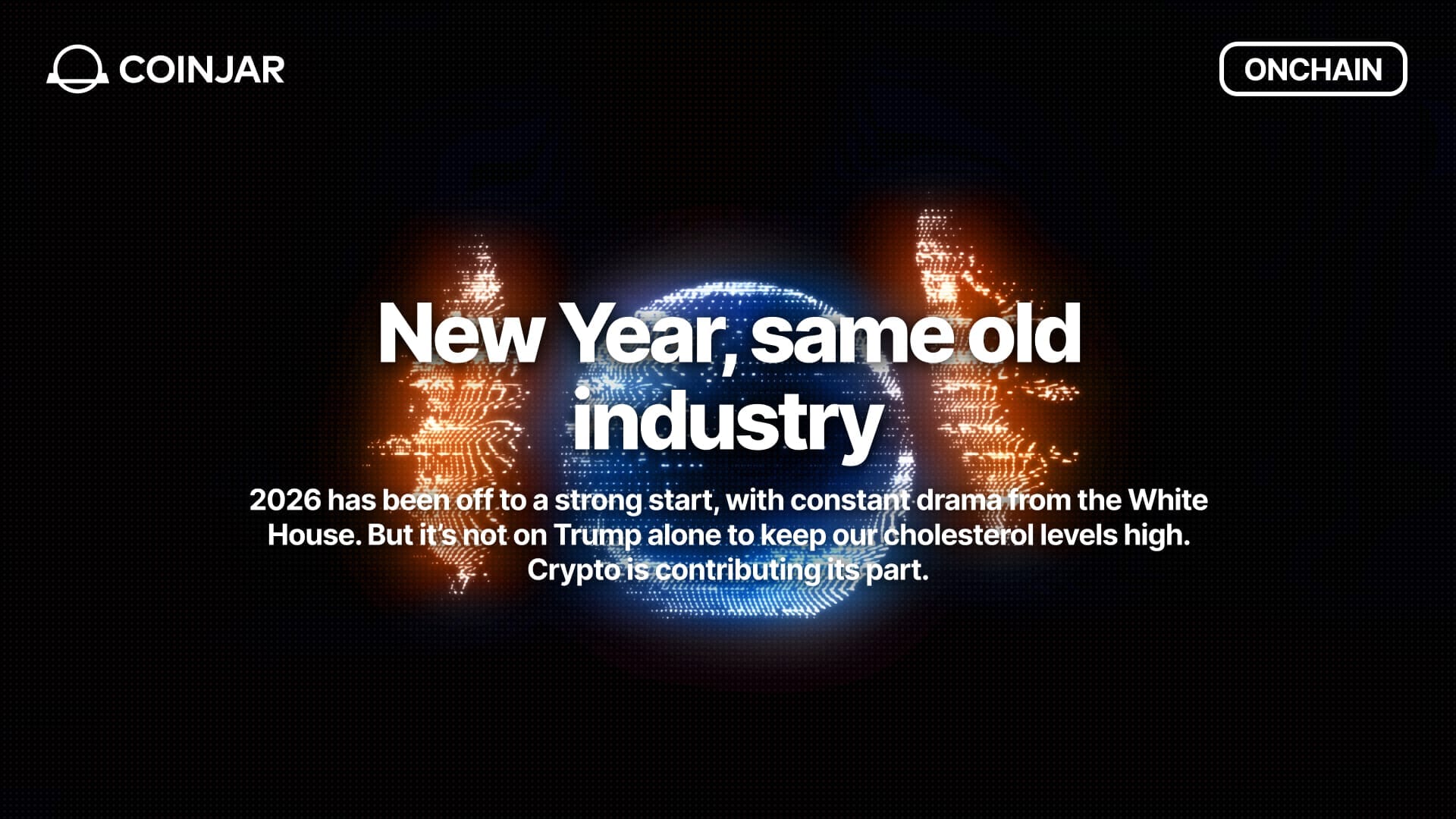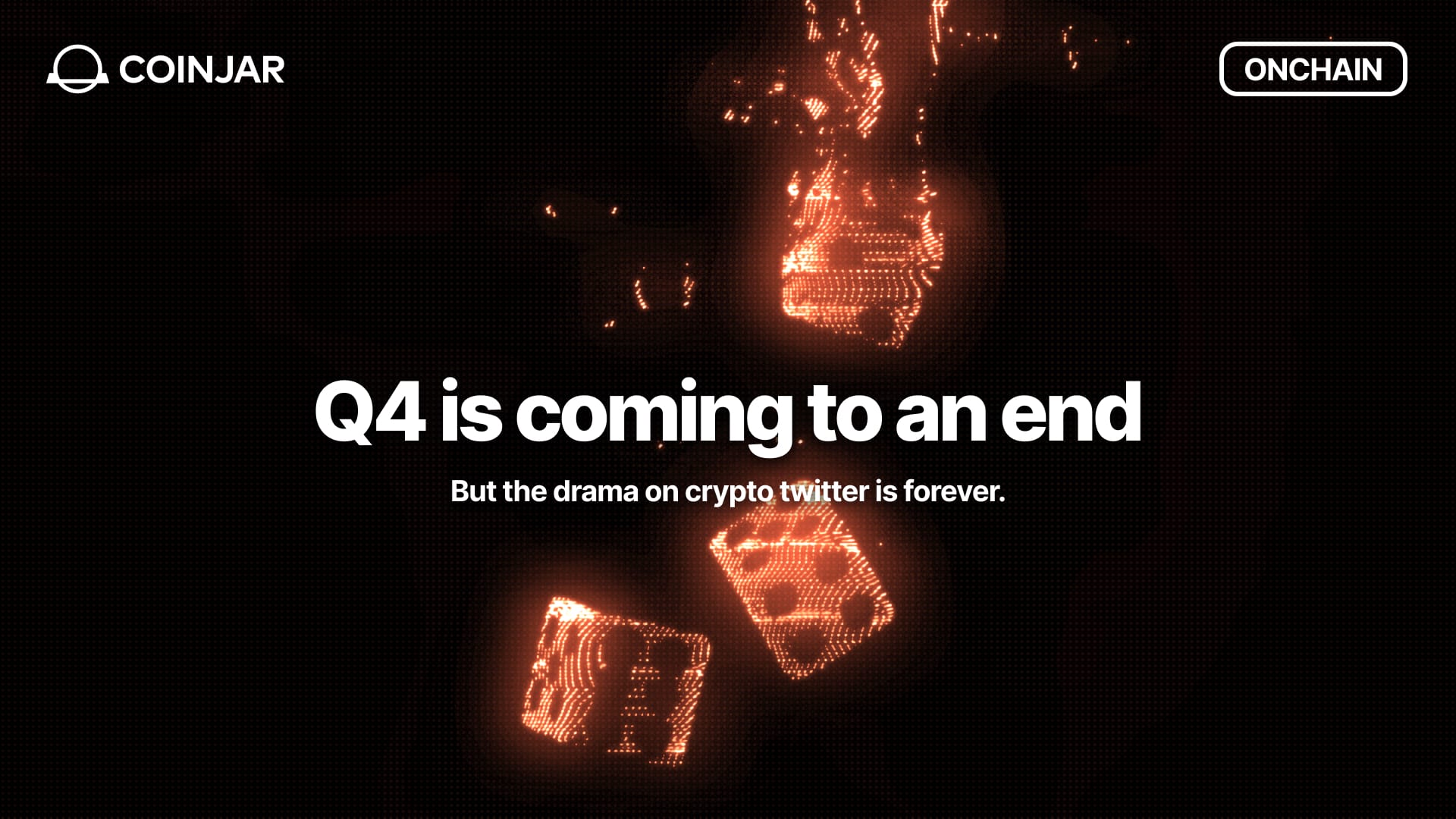Onchain: CFTC chooses violence, Visa lands on Solana and Vitalik gets hacked
September 13, 2023
Share this:

Story One
CFTC chooses violence
Someone at the CFTC must have had a bad flight home from vacation. Why else would they end the holiday season by bringing enforcement against 3 DeFi companies?
The Commission for Futures Trading figured it'd be a good idea to accuse Opyn, 0x (ZeroEx), and Deridex of having offered illegal digital asset derivatives to U.S. customers. Derivatives are financial instruments that allow traders to benefit from an underlying asset without buying the actual asset. They include things like futures and leveraged tokens.
All three accused have been told to cease operations and to pay fines ranging between $100k and $250k. It turns out that the CFTC found Opyn's geo-blocking wasn't sufficient to prevent U.S. traders from accessing their products. Needless to say, anyone who has ever used a VPN to watch Netflix from a different country can easily figure out why.
The fine comes especially surprising for 0x, the team behind the 0x protocol, who also runs the Matcha DEX aggregator, where people can trade leveraged tokens. However, these tokens have been issued by third parties and don't even make up 0.1% of the overall trading volumes. If this is how the CFTC wants to regulate, it implies that the sheer fact you deploy a protocol makes you responsible for any tokens ever issued on top of it.
Takeaway: Matcha is, first and foremost, a spot trading platform and outside the CFTC's control. That said, it's time to acknowledge for crypto that the CFTC turns out to be just as terrible in regulating crypto as the SEC.
Story Two
Visa lands on Solana
The head of crypto of Visa took to X (formerly Twitter) last week that the payment processor had started a pilot program using USDC on Solana for stablecoin settlements. Unfortunately for the Solana fanbase, this did not push up the price of Solana significantly despite being kind of a big deal. Nevertheless, this is a bear market, and the threat of FTX selling its SOL stack is still looming. 🐻
For Visa, this isn't the first crypto endeavor. They've been investigating blockchain for years and launched their first project on Ethereum. According to their PR, the company has since moved millions onchain. However, as anyone who ever paid $15 in gas just to get a $30 transfer executed on Ethereum knows, it can be expensive. In contrast, transactions on Solana are cheap, and despite its earlier problems with outages, the blockchain seems rather stable these days. Unlike the average degens' mental health.
Takeaway: Stablecoins might seem boring, but the fact remains that settlements in traditional payment networks are inefficient, often taking days. This can threaten the existence of especially smaller merchants. Integrations like the one Visa is pursuing, allow merchants to receive their funds faster and might even trickle down to users in the form of lower fees.
Story Three
Vitalik gets hacked
Speaking of the mental health of degens, those who recently clicked on a link shared on Vitalik Buterin's X timeline might have had one more reason to seek therapy. On September 9th, it became apparent that the Co-Founder of Ethereum had his X account breached.
Turns out, he's not invincible.

However, Vitalik is probably smarter and has a far wider reach, which made this breach more profitable. The hackers used the opportunity to share the link to a fake free NFT that was supposed to celebrate the arrival of Proto Dank Sharding, a new ethereum improvement.
In the end, enough people clicked that link for the hacker to make over $690k at the time of writing. The tweet has since been deleted, and Vitalik's father confirmed that it was indeed the work of hackers. On September 12th, Vitalik confirmed that the breach happened through a Sim Swap.
Takeaway: One of the best ways to be sure something is legit is easy: wait. If enough people mint something and it does not drain their wallet, that's a positive sign. You can also just create a new wallet for such high-risk operations. Be safe, not sorry.🛡️
Fact of the week: If you're still getting your 2-FA codes sent to your phone, it might be time to reconsider. In 2021, the FBI estimated that $68 million had been lost to Sim swap fraud.
- Naomi from CoinJar
The above article is not to be read as investment, legal or tax advice and takes no account of particular personal or market circumstances; all readers should seek independent investment, legal and tax advice before investing in cryptocurrencies. This article is provided for general information and educational purposes only. No responsibility or liability is accepted for any errors of fact or omission expressed therein. CoinJar, Inc. makes no representation or warranty of any kind, express or implied, regarding the accuracy, validity, reliability, availability, or completeness of any such information. Past performance is not a reliable indicator of future results.
Share this:
On/Offchain
Your weekly dose of crypto news & opinion.
Join more than 150,000 subscribers to CoinJar's crypto newsletter.
Your information is handled in accordance with CoinJar’s Privacy Policy.
More from CoinJar Blog

Onchain: New Year, Same old industry
January 15, 20262026 has been off to a strong start, with constant drama from the White House. But it’s not on Trump alone to keep our cholesterol levels high. Crypto is contributing its...Read more
Goodbye 2025: CoinJar's Year of Global Growth and Innovation
December 31, 20252025 saw CoinJar push into new regions and launch major product upgrades. Here's a preview of what lies ahead.Read more
Onchain: Q4 is coming to an end
December 17, 2025But the drama on crypto twitter is forever. Story One EoY reflections kicking in At least if you are to believe the one X article that has been all over my feed in the...Read moreYour information is handled in accordance with CoinJar’s Privacy Policy.
Copyright © 2025 CoinJar, Inc. All rights reserved.
CoinJar, Inc. is a registered Money Services Business with FinCEN and licensed as a money transmitter, NMLS #2492913. For a list of states in which CoinJar, Inc. is licensed or authorized to operate, please visit here. In certain other states, money transmission services are provided by Cross River Bank, Member FDIC.
This site is protected by reCAPTCHA and the Google Privacy Policy and Terms of Service apply.